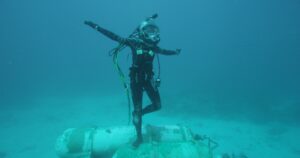On October 9th, WINGS will induct five new Fellows during our 2025 Women of Discovery Awards Gala in New York City. In a special Q&A series, we are sharing a little bit about each honoree. Dr. Grace C. Young is a Research Engineer and Lead Scientist at X, Alphabet’s Moonshot Factory (formerly GoogleX), where her team is creating radical new technologies to protect the ocean while feeding humanity sustainably. An avid sailor, diver and National Geographic Explorer, Grace is passionate about developing tools to better understand, explore and manage the ocean.

WINGS: Tell us your story. How did you get involved in science and your field specifically?
DR. GRACE C. YOUNG: I’ve always felt most myself near, on, or in the water. If I had to guess, this is because growing up I was never far from it, whether the Great Lakes in Michigan and Ohio or the Chesapeake Bay in Maryland. My high school robotics team introduced me to engineering and, then, discovering the Ocean Engineering Department at MIT was pivotal. I realized I could have a career that reflected a perfect storm of my passions for engineering and water. It’s been a whirlwind since then, from developing robots to coding artificial intelligence customized for the unique underwater challenges.
WINGS: What is something you would like people to understand about your work?
DR. GRACE C. YOUNG: What I’d like people to understand is that the ocean’s health is essential to life on Earth, including our own. Yet it’s under extreme stress for many reasons – climate change, overfishing, pollution, etc. Ocean solutions need contributions from, and cooperation among, people from many different backgrounds and experiences: engineers, biologists, geologists, computer scientists, lawyers, finance experts, or really anyone that breathes oxygen.
I’m an engineer, although I’ve often been called a marine biologist inadvertently. It’s a well-meaning mistake, yet one that my male colleagues generally don’t experience. The misconception’s basis is probably twofold: first, that marine biologists are the principal professionals working with the ocean, and second, that engineers are mostly men while marine biologists are mostly women. We can all expand our mental conceptions of who fits into certain roles and how we can achieve solutions together, especially for big problems like those facing the ocean.
WINGS: What are the greatest barriers to more women working in science?
DR. GRACE C. YOUNG: I’d say one of the barriers is lack of early age exposure. Women make incredible scientists. From my perspective, over the last 20 years, we’ve made a lot of progress in the US at introducing young women to science and engineering early. Although there is still work to do, I love seeing young girls being able to play with characters who look like them in STEM roles through LEGO sets, books, etc., and to see real-life role models of engineers and scientists highlighted in media that might otherwise only show actors and models.
To keep the momentum going, I’m committed to continuing efforts to increase girls’ and young women’s exposure to STEM education and exciting career opportunities through sponsorship, mentorship, and other outreach to other young women in the field. I was fortunate to have stumbled into my high school’s robotics team – the first girl to do so. Until then, I was on a path to become a professional ballerina with very little exposure to STEM activities. It was my fascination with our Roomba vacuum cleaner at home that led me to walk into our robotics lab as a 9th grader to figure out how it worked. The rest is history, but a critical factor was the role of mentors who recognized and nurtured my interests.
There are so many factors to this important topic. I started drafting an essay response for this questionnaire, but it got too long! I hope to discuss in more detail or publish something separately for those interested.
WINGS: What gets you up in the morning?
DR. GRACE C. YOUNG: It’s more who gets me up right now. My toddler makes sure I don’t sleep in. But I love going to my day job every day. It’s an extraordinary privilege to work in a community of brilliant people working together on solutions to some of our planet’s biggest problems.
WINGS: What’s your next challenge?
DR. GRACE C. YOUNG: One challenge for me currently is keeping up with the advancements in Artificial Intelligence, which is rapidly changing and advancing. Another challenge is maintaining an energizing connection to the water, even while much of my work is based on a laptop.
WINGS: Describe yourself in three words.
DR. GRACE C. YOUNG: Curious, Courageous, and Caring